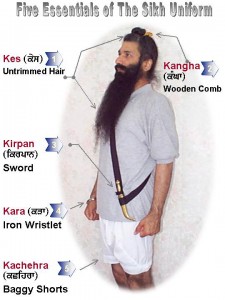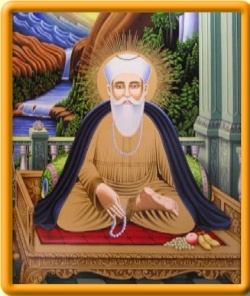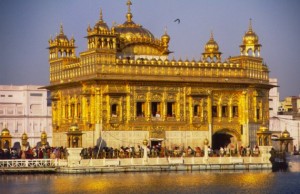Sikhism
Sikhism started in the 16th century and continued to develop until the 19th century into what we recognize it as today.
The Sikh religion is a monotheistic one, believing in one God like the founder, Guru Nanak, did as a member of the Sant (Saint) tradition. The Sant tradition is a devotional movement driven by poets writing hymns in praise of god(s). It includes people of all castes and all religious traditions (Hindu, Muslim, etc.). Guru Nanak was one of these Sants and he started his own path (the Nanak Panth) that would one day be called the Sikh religion.
The Sikhs are a people that are always ready for battle. They are not bloodthirsty or warmongers, but part of their doctrine is to defend those who are not able to defend themselves.
Five Ks:
-Kesh- Allowing the hair to grow out and never be cut.
-Kangha- Small wooden comb used twice a day; this keeps the hair tidy, and reminds the Sikh that their lives are to be tidy as well.
-Kara- An iron bangle to be worn at all times; this will remind the Sikh that whatever he/she does with her hands is to be kept in alignment with the teachings of the Guru.
-Kaccha- A traditional undergarment to be worn at all times. It reminds the Sikh of the mental battle between chastity and lust.
-Kirpan- A short dagger to be worn at all times. It allows the Sikh to defend any defenseless being at any moment.
Source: http://www.ramgarhiagurdwara.org/5ks.htm
Teachings:
-The goal is to live purely while staying in the world – there are no Monastic movements within Sikhism.
-By serving the community, one serves God.
-Remember God in all you do.
-Protect those who cannot protect themselves.
Important Figure(s):
-Guru Nanak:
- Born Hindu and worked in the Islamic community.
- Said there is One God and there are no divisions (no Islam, no Hinduism).
- He rejected caste and any other divisions that separated people.
- He was the first in a line of 10 Gurus that lead up to the formation of the Guru Granth Sahib.
Source: http://www.sikhiwiki.org/index.php/Guru_Nanak
-Gobind Singh:
- Tenth (and so last) of the line of Gurus following Nanak’s path
- Created the Khalsa, which lent more credibility to the Sikh/Nanak tradition
Religious Text(s):
-Guru Granth Sahib
- Includes all of the teachings of the ten Gurus
- The Gurus’ speeches (teachings) become the Guru
- Anyone who can read is allowed to read this text. There are no restrictions since all are equal.
–Adi Granth
- Key text of the Panth
- Compiled by Arjan Dev, the fifth Guru
- Includes teachings from Nanak and other Gurus
- Aside from containing Sikh traditions, it also contains writings of other Sants who were Hindu (Kabir and Ravidas) and Muslim (Mardana).
- Very diverse in its teachings
Holidays*:
-Guru Gobind Singh Ji- Celebrates the life of the tenth (and last) Sikh Guru
-Martyrdom of Guru Arjan Dev Ji- Commemorated the martyrdom of Guru Arjan. He was tortured and killed in the 17th century for including Islamic holy passages in his Sikh writings. The Muslim emperor at the time did not like that, and so he killed Arjan when he refused to remove the passages.
-Vaisakhi- This festival celebration commemorates the establishment of the Khalsa.
-Guru Nanak Gurpurab- This is one of the most sacred of Sikh festivals; it celebrates the birth of the first Sikh Guru, Nanak.
*Source: http://en.wikipedia.org/wiki/Public_holidays_in_India#Sikh_holidays
Vocabulary:
-Gurdwara- Sikh temple
Source: http://www.world-religions-professor.com/goldentemple.html
-Guru- One true God (and the lineage of teachers)
-Guru Granth Sahib- Sikh book of teachings
-Guru Panth- Sikh community of believers
-Seva- Service
-Prasad- Leftover offerings (mostly food) that were made to the gods
-Langar- A collective meal shared by members of the Sikh community. Everyone helps to make the food, eat the food, and clean up after the meal. Everyone sits on the ground together because all are equal.
-Khalsa- The pure
-Granthis- Ritual leaders and interpreters of the Sikh text



